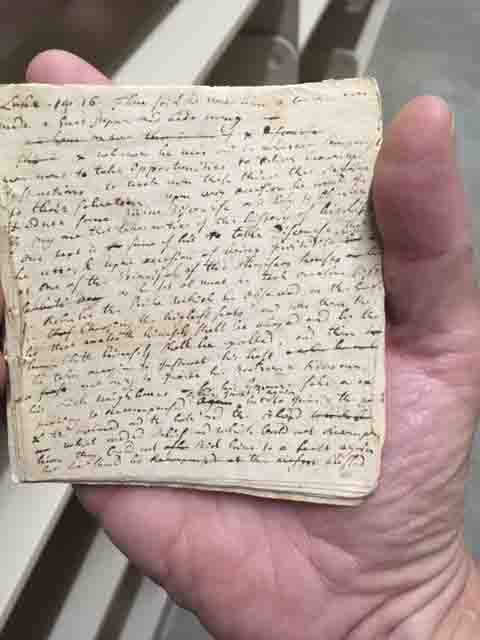
StephenCrocco
For more than 150 years, the works of prominent early American theologian and Yale alumnus Jonathan Edwards, class of 1722, were divided between two schools, Yale and its new affiliate Andover Newton Theological School. But, in a move emblematic of the schools’ shared futures, Yale and Andover Newton combined their collections of Edwards’ works this August.
With the acquisition, the Beinecke Rare Book and Manuscript Library now houses over 99 percent of the complete works of Edwards, including sermons, letters, notebook material and other assorted items, according to Kenneth Minkema, director of the Yale Divinity School’s Jonathan Edwards Center. Yale and Andover Newton’s combined collections include 100,000 pages of Edwards’ manuscripts, along with the writings of his disciples and family members.
“This is a real boon for scholars and for students who want to study Edwards,” Minkema said. “It’s part of this larger partnership, too, with Andover Newton, which presents a lot of rich opportunities for the study of theology, for the study of religious history and for supporting students through fellowship programs.”
Before the merging of the collections, Yale already owned the bulk of Edwards’ works. But the Andover Newton collection, while smaller than Yale’s, is really “special,” Minkema said, because it includes some of Edwards’ earlier writings from his time at Yale College, as well as his scientific writings.
During the 1800s, Edwards’ manuscripts were divided between two different branches of his lineage. Sereno Edwards Dwight, class of 1803 — son of former University President Timothy Dwight, class of 1769, and grandson of Edwards — gathered some of the manuscripts to create a multivolume edition of Edwards’ works, a project he left unfinished when he died. Elizabeth Dwight Smyth and her husband, an Andover Theological Seminary professor, inherited the collection and gifted it to his school.
The Jonathan Edwards Center, which was founded in the 1980s, achieved what Dwight could not: It compiled multivolume printed editions of Edwards’ writings. In 2014, three years before Andover Newton affiliated with the Divinity School, the Beinecke library financed the digitization of Yale and Andover Newton’s Edwards collections. The Center now maintains an open-access online archive of documents by and about Edwards on its website.
Since all Yale students and scholars can access the Edwards paper online for free, Divinity Library Director Stephen Crocco described the addition of Andover Newton’s primary documents as a symbolic yet important achievement.
“Jonathan Edwards is arguably one of Yale’s most famous graduates ever,” said Crocco. “He has had an enormous impact on the world, so to bring two sets of papers together is … a homecoming of these materials and a chance for Yale to acknowledge one of its most influential graduates.”
Still, Harry Stout, the Jonathan Edwards Professor of American Christianity at the Divinity School and a general editor for the collection, said students who take his and Minkema’s Edwards seminar will enjoy special perks.
Students in the seminar are the only in the world who have access to Edwards’ original manuscripts in the classroom, Stout explained.
“In my experience, printed and digital editions such as ours are wonderful resources, but there is no substitute for placing your hand on pages originally held by the writer — in this case Edwards,” he said. “It makes for an almost mystical connection.”
According to Minkema, the processes of digitizing and creating volumes had been an “uphill climb,” as Yale often hesitated to embrace Edwards’ legacy. Edwards, who Minkema called “the most important formulator of modern Evangelicalism,” was also one of the leading fire-and-brimstone preachers of the Great Awakening. Edwards is best known for his sermon “Sinners in the Hands of an Angry God,” in which he describes, in vivid detail, the terrible fate that await all those that sin and fail to repent. But Minkema told the News that Edwards’ works reveal a multidimensional figure, who wrote on the subject of God’s beauty and the “emanation” of God in nature.
Jennifer McCleery DIV ’19, who worked closely with Edwards’ writings during her time as a Divinity School student, expressed excitement about the reunion of the Edwards collection’s various parts. She called the collection an “awesome” resource and said one of her fondest memories from her time as a graduate student at the Divinity School is reading the original copy of Edwards’ sermon “Sinners in the Hands of an Angry God.”
Minkema emphasized how valuable it is to have faculty, students and staff from Andover Newton at the Divinity School, a result of the two schools’ recent partnership.
“They’re just as important [as obtaining the manuscripts],” he said.
Adelaide Feibel | adelaide.feibel@yale.edu







